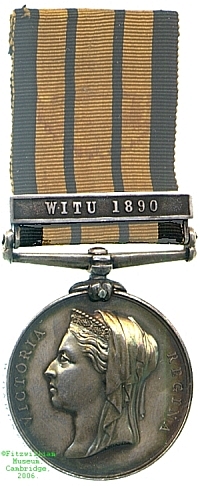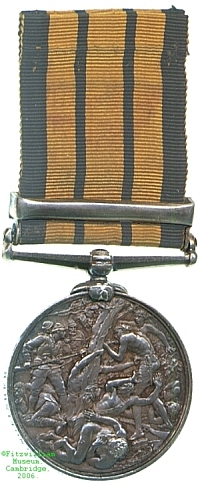
Obverse, a bust of Queen Victoria with crown and veil

Reverse, a scene of bush fighting around a tree with a fallen African to the fore

Obverse, a bust of Queen Victoria with crown and veil |

Reverse, a scene of bush fighting around a tree with a fallen African to the fore |
Peace-keeping operations in the British possessions in Africa, as anywhere else, required a large number of small campaigns, several of which, from 1892 until 1900, were considered to merit this medal, which in terms of design is a continuation of the Ashantee War Medal. Recipients who held that medal already were therefore awarded only extra clasps.
Witu was a small state in what is now Kenya. Established in 1858 as a colony of the Sultanate of Pate, it rapidly became threatened by the British-supported island Sultanante of Zanzibar. In 1885 therefore a pact with the growing German interests in East Africa saw Witu become a German Protectorate, defended by the German Tana Company. In 1890 however the Heligoland-Zanzibar Treaty between Britain and Germany saw the Protectorate ceded to the British East Africa Company. German settlers remained in Witu, and were less than popular with the locals in the new political climate, since they were felt to have sold the town into the hands of its enemies. In 1890 several German merchants in the city of Witu were murdered by mobs after a dispute with Sultan Fumo Bakari, and since the British East Africa Company did not have the resources to deal with the situation a British punitive expedition was sent in the form of 9 Royal Navy vessels. After burning several villages, this force campaigned to Witu itself, under continuous attack by Bakari's untrained riflemen and troops armed with less advanced weapons. It took Witu in short order, although the Sultan had already made his escape. His successor would prove still more intransigent and a further expedition had to be mounted in 1893.
The British forces suffered only a few men wounded. Among those unhurt was a Midshipman Roger Keyes, serving aboard HMS Turquoise, with whom another Watson Collection recipient earned a medal in China and who would finish his career as Admiral of the Fleet and a knight. Keyes was of course a recipient of the East and West Africa Medal with the Witu clasp for his involvement here in 1890; this medal, meanwhile, was awarded to Petty Officer 1st Class H. Gardner, who served in the campaign aboard the sloop HMS Kingfisher. Lester Watson acquired the medal at some point before 1928.